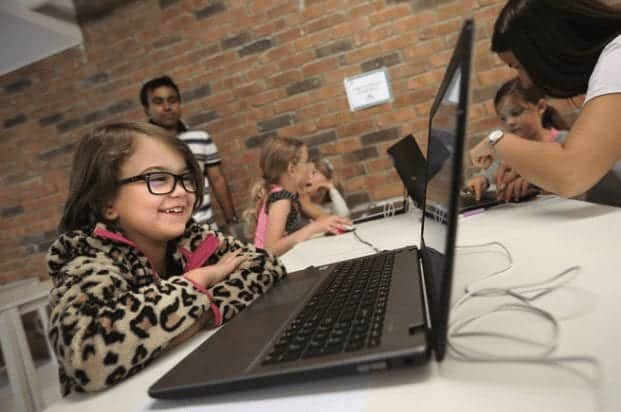Table of Contents
edCircuit Opinion
One thing that has remained true throughout the years is that the American people demand job creation. But are the American people prepared to fill the jobs that will become available to them? According to Quartz’s article American Schools Are Teaching Our Kids How To Code All Wrong there will be one million jobs in computing that will be unfilled by 2020. What are we doing wrong?
Perhaps the answer can be found by analyzing schooling for current students. The TIMES explains that today’s youth are simply not being taught programming languages. They’re not equipped for the emerging modern world because there’s no one preparing them.
Douglas Rushkoff argues that schools need to incorporate computer programming into the core curricula or face being left behind. While some schools have responded by integrating computing into their curricula, many have voiced that these measures have been ineffective. Current lesson plans allow students to simply, memorize the subject matter instead of honing their computational thinking skills. Other learning platforms, such as coding camps, teach participants the language behind their favorite video games. In doing so, they grab their students’ attention more effectively. What do you think? Do you believe that coding should be mandatory in schools?
At a Glance:
- Many students are being taught to memorize coding tutorials. Instead, they should be learning computer programming and computational thinking.
- Our schools need to incorporate computer programming into the core curriculum or get left behind.
- Programming languages could soon become as familiar in the classroom as French and computer science a literacy skill as essential as reading and writing.
Around the Web:
American schools are teaching our kids how to code all wrong
Idit Harel | Quartz
The US Department of Labor projects that one million jobs in computing will go unfilled by 2020. These are good jobs, jobs that would allow economic mobility and great earning potential over the course of a career. We know why these positions aren’t being filled—a lack of skilled candidates.
In response, there has been a national movement to teach computing to students in schools across the country. Many organizations, including my own company, are up for the challenge. Our country must make a commitment to teaching every child computer science. That doesn’t mean teaching watered down content and using simple coding apps but a strong curriculum that leads students to achieve real deep and broad mastery of computer science.
To read more visit Quartz
Why Basic Coding Should Be a Mandatory Class in Junior High
Tim Bajarin | TIME
One of the roles our education system is supposed to play is to prepare kids to be responsible citizens, with the skills needed to be successful in adulthood. All of the various classes — starting in kindergarten, where they lay out the fundamentals of reading, writing, sharing and even early math — are designed to be a set of building blocks of knowledge. Each consecutive year introduces new blocks in kids’ education, designed to get them ready for life so that they’re capable of earning a living.
For some reason, all of the classes I took from about third grade forward are still burned into my mind. Even today, I can go back in time and remember how my fifth-grade teacher got me interested in math or how my seventh-grade teacher’s method of teaching Spanish crippled my ability to learn that language due to his “repetitive” teaching methods.
However, one class in seventh grade has become very important to me, as I use the skills I learned in that class every day of my life: That class was my typing class. I can still envision that class as if it were yesterday, with my seat in the middle of the first row, learning to touch-type on an IBM Selectric typewriter. I even remember the line I had to type over and over again as part of a test to determine how fast I typed: “Now is the time for all good men to come to the aid of their country.” I can still touch-type that sentence today in about five seconds. Back then, the goal was to touch type at about 90 words per minute.
To read more visit TIME
The seven-year-olds who are learning how to code
Sunny Freeman | The Star
First and second-graders are racing from one side of the room to another, comparing designs of the buttons they’ve created, howling at their wacky ad-libs — and poking a robot in the eye.
It may sound like a typically chaotic Toronto classroom, but these kids are actually learning the building blocks of computer programming at a one-day Kids Learning Code camp — one of the many being held throughout the city this summer.
They learn the basics by dragging and dropping simple instruction boxes into blocks of code that tell a computer what to do. And the toys they work with show them an immediate, tangible result from their commands.
Ruby, Scratch, and Unity might sound foreign. But for the next generation, such programming languages could soon become as familiar in the classroom as French and computer science a literacy skill as essential as reading and writing.
To read more visit The Star
